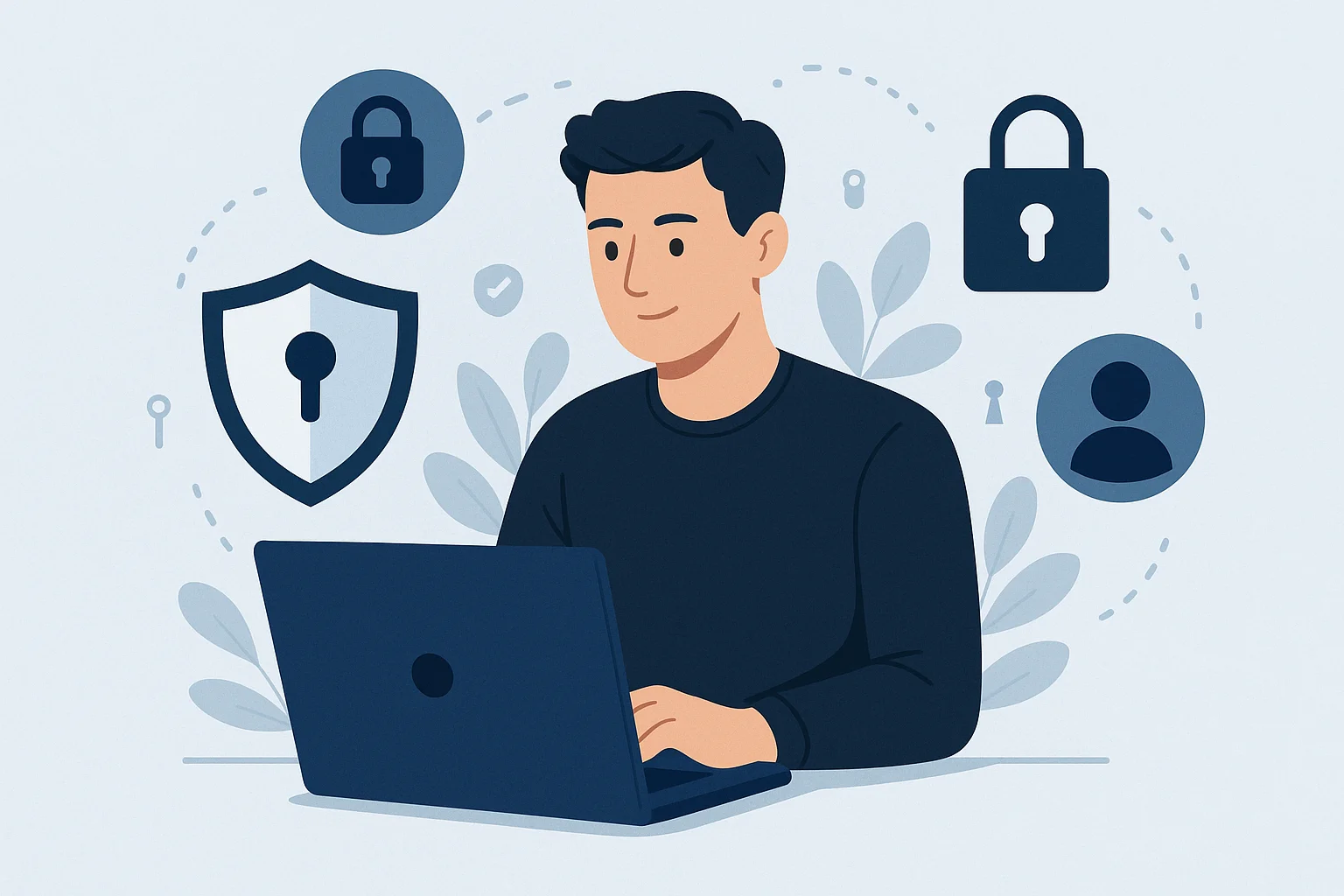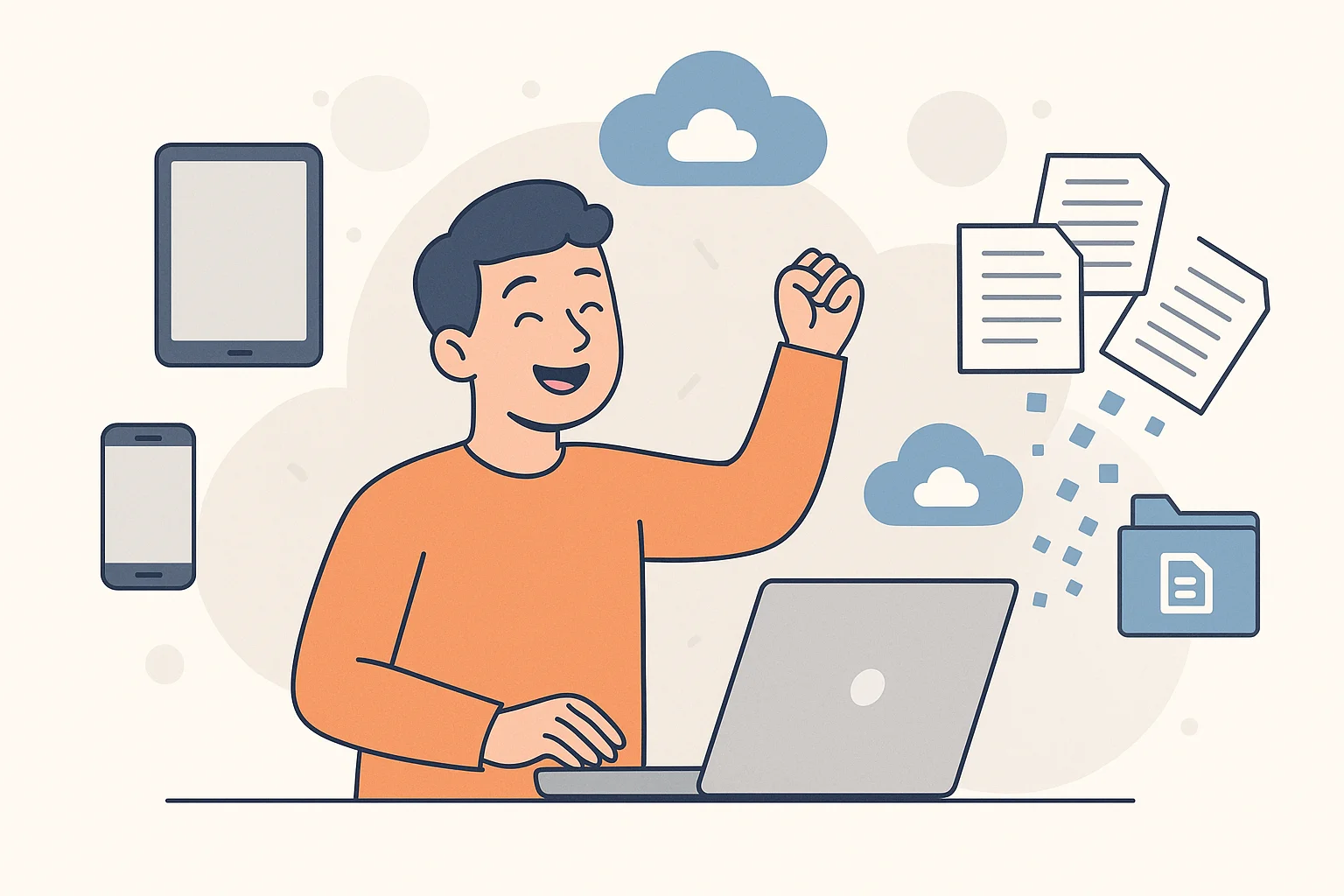Now Reading: 10 Digital Privacy Tips for Everyday Users
-
01
10 Digital Privacy Tips for Everyday Users
10 Digital Privacy Tips for Everyday Users

In a world where our personal information is constantly being collected, shared, and sometimes stolen, protecting your digital privacy has never been more important.
These digital privacy tips for everyday users will empower you to shield your personal information from prying eyes and secure your online presence with minimal effort.
Key Takeaways
What are the top digital privacy tips for everyday users?
- Use strong, unique passwords and enable two-factor authentication
- Review and tighten privacy settings on social media and apps
- Keep software and apps updated to patch security vulnerabilities
- Use encryption and VPNs to protect your data and browsing activity
- Limit data sharing with websites, apps, and third parties
- Be cautious with links, downloads, and suspicious communications
- Remove personal information from data brokers and search engines
- Use privacy-focused browsers and search engines
Strengthen Your Password Security
One of the most fundamental digital privacy tips for everyday users is to create strong, unique passwords for each of your accounts. Weak passwords are like leaving your front door unlocked – they’re an invitation for hackers to access your personal information.
Use a Password Manager
I strongly recommend using a password manager to generate and store complex passwords. These tools create random combinations of letters, numbers, and symbols that are nearly impossible to guess. Plus, you’ll only need to remember one master password instead of dozens of different ones.
Password managers also:
- Alert you to potentially compromised passwords
- Automatically fill login forms
- Sync across multiple devices
- Store secure notes and payment information
Enable Multi-Factor Authentication
Adding a second layer of security through multi-factor authentication (MFA) is crucial for protecting your accounts. Even if someone manages to steal your password, they’ll still need access to your phone or authentication app to log in.
Enable MFA on all accounts that offer it, especially:
- Email accounts
- Banking and financial services
- Social media platforms
- Cloud storage services
- Shopping websites with stored payment information
This simple step dramatically reduces the risk of unauthorized access to your accounts, making it one of the most effective digital privacy tips for everyday users.
Review and Tighten Privacy Settings
Many apps and services collect far more information than necessary by default. Taking control of your privacy settings is essential for limiting data collection and protecting your personal information.
Social Media Privacy Audit
Social media platforms are designed to encourage sharing, but this can expose your personal information to unwanted audiences. I recommend conducting a thorough privacy audit of all your social media accounts:
- Set profiles to private when possible
- Limit who can see your posts and personal information
- Disable location tracking and tagging features
- Review and remove unnecessary third-party app connections
- Consider what you “like” on social media, as these can appear in search results
Remember that even with strict privacy settings, information shared on social media is never completely private. Website administrators, law enforcement, and determined hackers may still access your data.
App Permissions Management
Mobile apps often request permissions they don’t actually need to function. When installing new apps, carefully review permission requests and only grant access to what’s necessary. For existing apps:
- Review and revoke unnecessary permissions
- Disable location tracking when not needed
- Turn off microphone and camera access for apps that don’t require them
- Limit ad tracking and personalization
By regularly auditing your app permissions, you can significantly reduce data collection and potential privacy vulnerabilities.
Useful Articles:
Keep Software Updated
Software updates aren’t just about new features – they often include critical security patches that protect you from newly discovered vulnerabilities. Cybercriminals actively exploit these security gaps in outdated software.
Enable Automatic Updates
I always recommend enabling automatic updates on all your devices to ensure you’re protected without having to remember to check manually. This applies to:
- Operating systems (Windows, macOS, iOS, Android)
- Web browsers
- Mobile apps
- Antivirus and security software
- Smart home devices
Remove Unused Apps and Extensions
Outdated or unused apps and browser extensions can continue collecting data and may become security risks. Regularly audit your devices and:
- Uninstall apps you no longer use
- Remove browser extensions you don’t need
- Delete accounts for services you’ve stopped using
This not only improves your privacy but can also enhance device performance and battery life.
Use Encryption and VPNs
Encryption is like a secret code that makes your data unreadable to anyone without the proper key. Incorporating encryption into your digital life is one of the most powerful digital privacy tips for everyday users.
Encrypt Your Devices
Modern smartphones typically encrypt data by default, but you may need to enable encryption on computers:
- Windows: Use BitLocker (built into Pro and Enterprise editions)
- Mac: FileVault is built into macOS
- External drives: Use encryption software before storing sensitive information
Encryption ensures that even if your device is lost or stolen, your personal information remains protected.
Secure Your Communications
Not all messaging apps provide the same level of privacy. I recommend using apps with end-to-end encryption for sensitive communications:
- Signal
- Telegram (in secret chat mode)
These apps ensure that only you and your recipient can read messages – not even the service provider can access the content.
Use a VPN for Browsing
A Virtual Private Network (VPN) creates an encrypted tunnel for your internet traffic, hiding your browsing activity from your internet service provider and potential hackers. VPNs are especially important when:
- Using public Wi-Fi networks
- Accessing sensitive accounts
- Wanting to prevent tracking by websites and advertisers
- Browsing from locations where privacy is a concern
A quality VPN service is a worthwhile investment for comprehensive online privacy protection.
Limit Data Sharing
The less information you share online, the better protected your privacy will be. Being mindful about what data you provide and to whom is a crucial digital privacy practice.
Minimize Information Sharing
Before providing personal information to websites, apps, or services, ask yourself:
- Is this information necessary for the service I’m using?
- What will this company do with my data?
- Is there a privacy-friendly alternative?
When possible, use temporary email addresses for one-time signups and avoid providing real phone numbers for verification when alternatives exist.
Manage Cookies and Trackers
Websites use cookies and other tracking technologies to follow your online activities. To reduce tracking:
- Decline non-essential cookies when prompted
- Regularly clear browsing data and cookies
- Use browser extensions that block trackers
- Consider privacy-focused browsers like Firefox or Brave
Disable Ad Personalization
Personalized advertising relies on extensive data collection about your interests and online behavior. Opt out of ad personalization where possible:
- Google services
- Apple advertising
- Facebook ad settings
- Microsoft advertising
- Amazon personalization
While you’ll still see ads, they won’t be based on detailed tracking of your online activities.
Useful Articles:
Practice Safe Browsing Habits
Even with technical safeguards in place, your online behavior plays a crucial role in maintaining digital privacy. Developing safe browsing habits is essential for protecting your personal information.
Be Cautious with Links and Downloads
Phishing attacks and malicious downloads are common methods for stealing personal information. Always:
- Verify the sender before clicking email links
- Hover over links to check their actual destination
- Type important website addresses directly rather than clicking links
- Only download software from official sources
- Be suspicious of unexpected attachments, even from known contacts
Avoid Oversharing on Social Media
Information shared on social media can be used for identity theft, targeted phishing, or other malicious purposes. Be mindful about posting:
- Full birth dates
- Home addresses
- Phone numbers
- Travel plans
- Photos that reveal your location
- Children’s names and schools
Remember that seemingly innocent information can be combined with other data to build a detailed profile of you and your habits.
Use Private Browsing When Needed
While private browsing doesn’t make you completely anonymous online, it can help in specific situations by:
- Not saving your browsing history locally
- Deleting cookies when you close the browser
- Preventing websites from using existing cookies to track you
I recommend using private browsing when using shared computers or researching sensitive topics.
Remove Personal Information from Data Brokers
Data brokers collect and sell your personal information to advertisers, marketers, and sometimes even scammers. Taking steps to remove your data from these services is an important but often overlooked digital privacy tip for everyday users.
Identify Data Broker Listings
Start by searching for your name online to see where your information appears. Common data broker sites include:
- Whitepages
- Spokeo
- Radaris
- BeenVerified
- Intelius
Request Data Removal
Each data broker has its own process for removing personal information. This typically involves:
- Finding your listing on the site
- Submitting a removal request
- Verifying your identity
- Following up if necessary
This process can be time-consuming, so consider using privacy services that automate removal requests across multiple platforms.
Maintain Regular Removal Efforts
Unfortunately, data brokers often re-add information over time. Set a reminder to check and repeat removal requests every few months to maintain your privacy.
Use Privacy-Focused Search and Browsing
Mainstream search engines and browsers collect extensive data about your online activities. Switching to privacy-focused alternatives can significantly reduce tracking.
Privacy-Focused Search Engines
Consider alternatives to Google and Bing that don’t track your searches:
- DuckDuckGo
- Startpage
- Brave Search
- Qwant
These search engines deliver results without building a profile of your interests and online behavior.
Privacy-Enhancing Browser Settings
If you prefer to stick with mainstream browsers, adjust their settings to enhance privacy:
- Disable third-party cookies
- Block trackers
- Turn off search suggestions
- Disable location tracking
- Use HTTPS-only mode
Clear Your Search History
Regularly delete your search history from Google, Bing, and other services:
- For Google: Visit the My Activity dashboard and delete your data
- For Microsoft: Clear data from both Microsoft Edge and Bing
- For Yahoo: Use search history management to delete records
Consider setting up automatic deletion after a certain period to minimize data retention.
Useful Articles:
Secure Your Home Network
Your home network is the gateway to all your connected devices. Securing it properly is a fundamental digital privacy tip for everyday users that’s often overlooked.
Update Router Settings
Many routers come with default settings that aren’t secure. I recommend:
- Changing the default admin username and password
- Creating a strong, unique Wi-Fi password
- Enabling WPA3 encryption (or WPA2 if WPA3 isn’t available)
- Disabling remote management
- Keeping router firmware updated
Segment Your Network
If possible, create separate networks for different types of devices:
- Primary network for computers and phones
- Guest network for visitors
- IoT network for smart home devices
This prevents compromised devices from accessing your most sensitive information.
Secure Smart Home Devices
Smart home devices can create privacy vulnerabilities. To minimize risks:
- Change default passwords on all devices
- Regularly check for and install firmware updates
- Disable unnecessary features and connections
- Review privacy policies before purchasing new devices
- Consider the privacy implications of devices with microphones and cameras
Protect Your Email Privacy
Email remains one of our most important digital tools, making it a prime target for privacy invasions and security breaches.
Use Separate Email Addresses
I recommend using different email addresses for different purposes:
- Primary email for personal communications
- Secondary email for online shopping and services
- Disposable email addresses for one-time signups
This compartmentalization prevents all your accounts from being compromised if one email address is breached.
Be Wary of Email Tracking
Many marketing emails contain tracking pixels that reveal when you’ve opened an email and what links you’ve clicked. To reduce tracking:
- Disable automatic image loading in your email client
- Use email services that block tracking pixels
- Consider using a privacy-focused email provider like ProtonMail or Tutanota
Encrypt Sensitive Emails
Standard email isn’t secure for highly sensitive information. For confidential communications:
- Use end-to-end encrypted email services
- Encrypt attachments before sending
- Consider alternative secure messaging platforms
Regularly Audit Your Digital Footprint
Your digital footprint grows constantly as you use online services. Regular audits help you maintain control over your personal information.
Check Account Security
I recommend periodically reviewing all your online accounts:
- Close unused accounts
- Update security settings
- Check for unauthorized access or suspicious activity
- Review connected apps and services
Many services offer security checkups that guide you through this process.
Monitor Your Credit
Identity theft often manifests as unauthorized financial activity. Regularly check your credit reports and consider:
- Setting up fraud alerts
- Freezing your credit when not actively applying for new accounts
- Using credit monitoring services
Early detection of identity theft can significantly reduce its impact on your finances and reputation.
Google Yourself Regularly
Searching for your name, email address, and phone number can reveal what information is publicly available about you. This helps you identify:
- Data that needs to be removed
- Accounts you’ve forgotten about
- Potential identity theft or impersonation
Implementing these digital privacy tips for everyday users doesn’t require technical expertise-just awareness and consistent habits. By taking control of your passwords, privacy settings, data sharing, and online behavior, you can significantly reduce privacy risks while still enjoying the benefits of digital life.
Useful Articles:




















